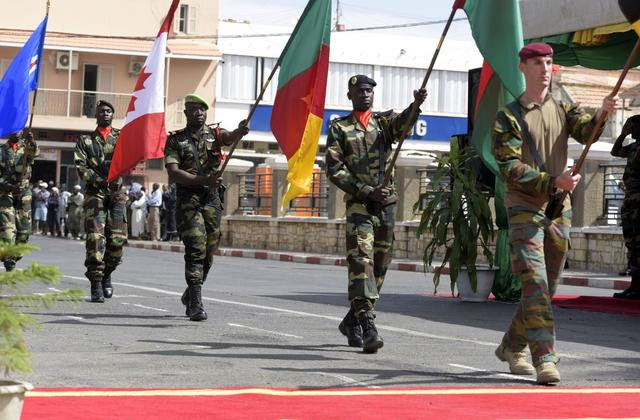US NEWS & WORLD REPORT
Stand Strong With Africa
By James S. Robbins | Contributor
(SEYLLOU/AFP/Getty Images)

The security situation in North Africa is growing increasingly dire, with destabilized countries and growing terrorist groups. Meanwhile, the U.S. combatant command for the region has been stuck in Germany for eight years. It is time to make another attempt to find a host country in Africa, and Morocco may be the place.
U.S. Africa Command, or AFRICOM, is “responsible for all U.S. Department of Defense operations, exercises and security cooperation on the African continent, its island nations, and surrounding waters.” Since its inception as an independent command in October 2008, AFRICOM headquarters has been located at Kelley Barracks in Stuttgart, Germany. Other command assets are located at Ramstein Air Base in Germany; in Italy at Vicenza and Naples; and at Camp Lemonnier in Djibouti. AFRICOM’s European headquarters was intended to be temporary, lasting only until a basing agreement could be reached with a partner country on the continent.
However, years later, this task remains unfulfilled. Potential hosts saw the move as provocative, and cited popular dissatisfaction with U.S. policies in Iraq and Afghanistan. There were also concerns about the U.S. dispatching a significant troop presence, though the headquarters element would number under 2,000 people, about half of which would be defense civilians and workers from other U.S. government agencies. Frustration at the inability to relocate AFRICOM has led some to consider giving up on the project altogether. Reviews in 2012 to 2013 by the Department of Defense and the General Accounting Office debated the relative merits of keeping AFRICOM in its temporary facilities in Stuttgart or, citing cost savings, moving the headquarters back to the United States.
Meanwhile, the security situation in Africa has degraded significantly. U.S.-backed military intervention in Libya in 2011 produced a failed state of warring militias and terrorist groups. Egypt faces a rising terrorist presence in the Sinai, following a revolution in 2011 and military coup in 2013. Tunisia has become a leading source for recruitment by the Islamic State terror group, which is increasing its presence across North Africa. Al-Qaida in the Islamic Maghreb has remained active, recently conducting attacks in Mali, Burkina Faso and the Ivory Coast. Nigeria’s Boko Haram movement, now affiliated with the Islamic State group, has carried out cross-border operations in Cameroon and Chad. These challenges only exacerbate the civil wars and tribal conflicts endemic throughout sub-Saharan Africa, and compound the growing regional involvement of strategic competitors China and Russia.
These developments point to a growing need for enhanced U.S. commitment to the region, and moving the AFRICOM headquarters there would be a useful gesture. And the Kingdom of Morocco is an obvious choice as a destination. An oasis of stability in an otherwise fractious neighborhood, it is a longstanding U.S. partner and major non-NATO ally with a history of security cooperation and arms transfers. Morocco hosts the annual African Lion combined exercise, which in 2016 involved troops from the U.S., Morocco, Germany, Senegal, Mauritania, Italy, Spain, Canada, the Netherlands, the U.K. and Tunisia. Morocco has also cooperated with the U.S. Air Force in periodically staging Exercise Majestic Eagle.
In 2008, it was rumored that the U.S. and Morocco would conclude an agreement to base AFRICOM in the city of Tan-Tan, in the south-central part of the country. But the deal was not concluded, according to a State Department cable, as a result of caution from Morocco’s government over the “strong popular disapproval of the U.S. presence in Iraq and Afghanistan” and “a need to not move too far beyond Moroccan public opinion.” But it is worth investigating how public opinion has shifted in the intervening years. Iraq and Afghanistan have moved off center stage, replaced by the Islamic State group, Libya, Syria and Iran. The Moroccan people may now see the protective role of the United States more positively as potential threats move closer.
The U.S. could also link a potential AFRICOM hosting agreement to support for Morocco’s claim of sovereignty over the former Spanish colony of Western Sahara. The matter has been in dispute for decades, chiefly between Morocco and the Algerian-backed Polisario Front separatist group. United Nations Secretary-General Ban Ki-moon created a controversy last month when, during a visit to the area, he said it was under Moroccan “occupation,” a comment for which he has since apologized. The United States has failed at past attempts to broker a deal to resolve the dispute, so to break the logjam Washington could suggest basing AFRICOM in Laayoune, in the disputed area, as tacit if not explicit recognition of Morocco’s claim. In concept, the base could be established in the manner of Camp Lemonnier in Djibouti, starting with a small presence and building as needs and opportunities dictate.







